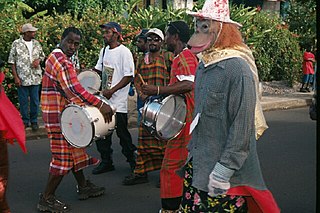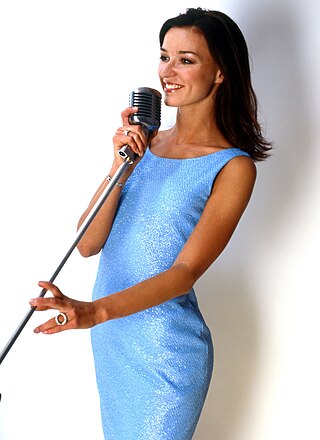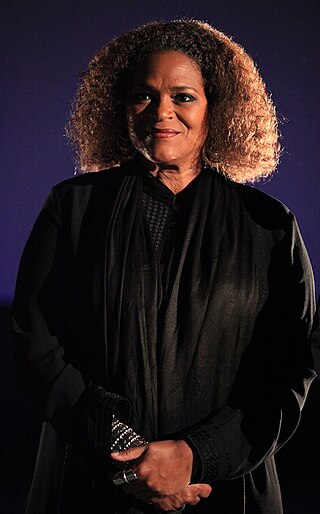Related Research Articles
The music of Haiti combines a wide range of influences drawn from the diverse population that has settled on this Caribbean island. It often has hints of French, African rhythms, Spanish elements and others who have inhabited the island of Hispaniola and minor native Taino influences. Styles of music unique to the nation of Haiti include music derived from rara parading music, twoubadou ballads, mini-jazz rock bands, rasin movement, hip hop Creòle, the wildly popular compas, and méringue as its basic rhythm. Haitian music is influenced mostly by European colonial ties and African migration. In the case of European colonization, musical influence has derived primarily from the French.
The music of Martinique has a heritage which is intertwined with that of its sister island, Guadeloupe. Despite their small size, the islands have created a large popular music industry, which gained in international renown after the success of zouk music in the later 20th century. Zouk's popularity was particularly intense in France, where the genre became an important symbol of identity for Martinique and Guadeloupe. Zouk's origins are in the folk music of Martinique and Guadeloupe, especially Martinican chouval bwa, and Guadeloupan gwo ka. There's also notable influence of the pan-Caribbean calypso tradition and Haitian kompa.
The music of Guadeloupe encompasses a large popular music industry, which gained in international renown after the success of zouk music in the later 20th century. Zouk's popularity was particularly intense in France, where the genre became an important symbol of identity for Guadeloupe and Martinique. Zouk's origins are in the folk music of Guadeloupe and Martinique, especially Guadeloupan gwo ka and Martinican chouval bwa, and the pan-Caribbean calypso tradition.

The music of Dominica includes a variety of genres including all the popular genres of the world. Popular music is widespread, with a number of native Dominican performers gaining national fame in imported genres such as calypso, reggae, soca, kompa, zouk and rock and roll. Dominica's own popular music industry has created a form called bouyon, which combines elements from several styles and has achieved a wide fanbase in Dominica. Groups include WCK, Native musicians in various forms, such as reggae, kadans (Ophelia Marie, and calypso, have also become stars at home and abroad.
The music of the Lesser Antilles encompasses the music of this chain of small islands making up the eastern and southern portion of the West Indies. Lesser Antillean music is part of the broader category of Caribbean music; much of the folk and popular music is also a part of the Afro-American musical complex, being a mixture of African, European and indigenous American elements. The Lesser Antilles' musical cultures are largely based on the music of African slaves brought by European traders and colonizers. The African musical elements are a hybrid of instruments and styles from numerous West African tribes, while the European slaveholders added their own musics into the mix, as did immigrants from India. In many ways, the Lesser Antilles can be musically divided based on which nation colonized them.
Zouk is a musical movement and dance pioneered by the French Antillean band Kassav' in the early 1980s. It was originally characterized by a fast tempo, a percussion-driven rhythm, and a loud horn section. Musicians from Martinique and Guadeloupe eventually added MIDI instrumentation to their compas style, which developed into a genre called zouk-love. Zouk-love is effectively the French Lesser Antilles' compas, and it gradually became indistinguishable from compas.
Kassav', also alternatively spelled Kassav, is a French Caribbean band that originated from Guadeloupe in 1979. The band's musical style is rooted in the Guadeloupean gwoka rhythm, as well as the Martinican tibwa and Mendé rhythms. Regarded as one of the most influential bands in 20th-century French West Indies music, Kassav is often credited with pioneering the zouk musical genre. Their musical evolution is a synthesis of cadence-lypso and compas traditions.

Compas, also known as konpa or kompa, is a modern méringue dance music genre of Haiti. The genre was popularized by Nemours Jean-Baptiste following the creation of Ensemble Aux Callebasses in 1955, which became Ensemble Nemours Jean-Baptiste in 1957. The frequent tours of the many Haitian bands have cemented the style in all the Caribbean. Therefore, compas is the main music of several countries such as Dominica and the French Antilles. Whether it is called zouk, where French Antilles artists of Martinique and Guadeloupe have taken it, or konpa in places where Haitian artists have toured, this méringue style is influential in part of the Caribbean, Portugal, Cape Verde, France, part of Canada, and South and North America.

The culture of Dominica is formed by the inhabitants of the Commonwealth of Dominica. Dominica is home to a wide range of people. Although it was historically occupied by several native tribes, it was the Taíno and Island Caribs (Kalinago) tribes that remained by the time European settlers reached the island. "Massacre" is a name of a river dedicated to the murders of the native villagers by both French and British settlers, because the river "ran red with blood for days." Each claimed the island and imported slaves from Africa. The remaining Caribs now live on a 3,700-acre (15 km2) Carib Territory on the east coast of the island. They elect their own chief.
Cadence rampa, or simply kadans, is a dance music and modern méringue popularized in the Caribbean by the virtuoso Haitian sax player Webert Sicot in the early 1960s. Cadence rampa was one of the sources of cadence-lypso. Cadence and compas are two names for the same Haitian modern méringue.
Cadence-lypso is a fusion of cadence rampa from Haiti, Jazz, Blues and calypso from Trinidad and Tobago that has also spread to other English speaking countries of the Caribbean. Originated in the 1970s by the Dominican band Exile One, it spread and became popular in the dance clubs around the Creole world and Africa as well as the French Antilles.
Experience 7 was a Guadeloupean kadans band formed in the mid-1970s, led by Guy Houllier and Yves Honore. However, unlike Kassav' or Malavoi, the small band produced most of its songs with Henry Debs in Guadeloupe.

Edith Lefel was a French singer.

"Le Dernier qui a parlé..." is a song recorded by singer-songwriter Amina, with music composed by Wasis Diop and lyrics by Amina herself. It represented France in the Eurovision Song Contest 1991, performed as "C'est le dernier qui a parlé qui a raison".

As an overseas department of France, Martinique's culture is French, African and Caribbean. Its former capital, Saint-Pierre, was often referred to as the Paris of the Lesser Antilles. The official language is French, although many Martinicans speak a Creole patois. Based in French, Martinique's Creole also incorporates elements of English, Spanish, Portuguese, and African languages. Originally passed down through oral storytelling traditions, it continues to be used more often in speech than in writing.
Henri Guédon was a French percussionist from Martinique. His first band was called La Contesta and he organised it when he was 20. He was awarded a Maracas d'or the first year the awards ran. In 1983, Philippe Langlais invited him to compose a mix of classical and jazz with his orchestra, the resulting composition called Opéra Triangulaire. He was a judo champion 1963-65. Multiple albums fused Antillean rhythms with other music from around the world. Guedon was instrumental in exporting the new sound of 60s and 70s Latin -guaguanco, boogaloo, salsa, descarga - to France and the rest of Europe. When Guedon began placing his percussion instruments at the front of the stage in the style of his great influence Ray Barretto, French audience members found themselves shocked and intrigued. Soon enough, greats like El Conde and Pacheco were touring France. Were it not for Henri Guedon, Europe could have conceivably taken years to move forward from mambo and cha-cha-cha.
Joëlle Ursull is a French singer.

Marija Naumova-Bullīta, known professionally as Marija Naumova, is a Latvian singer of Russian origin. Under the stage name Marie N, she sings a broad range of music ranging from pop to musical theatre and jazz, and has recorded several albums, with songs in Latvian, French, English, Russian and Portuguese. In 2002, she won the Eurovision Song Contest for Latvia with her song "I Wanna".

Jocelyne Béroard is a Martinican singer and songwriter. She is one of the lead singers of the Zouk and Compas band Kassav'. As a solo artist, she helped create zoukBeton, a music genre originated by the seminal Martinican Creole band Kassav' from Paris, the main members of which are from Guadeloupe and Martinique.
References
- ↑ Manuel, Peter Lamarche; Bilby, Kenneth M.; Largey, Michael D. (2006). Caribbean currents: Caribbean music from rumba to reggae. Temple University Press. pp. 174–. ISBN 978-1-59213-463-2 . Retrieved 16 May 2011.
- ↑ "Exemples de traduction provenant de sources externes pour 'par la Sacem'". SACEM. Retrieved 3 September 2013.
- ↑ "RFI Music: Kali". Archived from the original on 23 February 2009. Retrieved 18 August 2013.